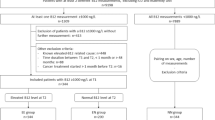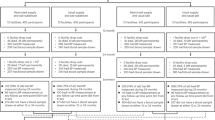Abstract
CLINICALLY, the view is widely held that major surgical operations may encourage the growth of metastases in patients with certain types of cancer (stage III breast carcinoma, Wilm's tumour, bone and soft tissue sarcomas). It is possible that operative stress may favour the spread of tumours by affecting the adhesion between cells. In view of the known relation between lack of adhesiveness and low calcium content1, an investigation of calcium and phosphorus metabolism in patients undergoing surgery has been undertaken.
This is a preview of subscription content, access via your institution
Access options
Subscribe to this journal
Receive 51 print issues and online access
$199.00 per year
only $3.90 per issue
Buy this article
- Purchase on Springer Link
- Instant access to full article PDF
Prices may be subject to local taxes which are calculated during checkout
Similar content being viewed by others
References
Coman, D. R., Science, 105, 347 (1947).
Bronner, F., Harris, R. S., Maletskos, C. J., and Benda, C. E., J. Clin. Invest., 35, 78 (1956).
Author information
Authors and Affiliations
Rights and permissions
About this article
Cite this article
STARR, K., WYNNE, K. & CHORLTON, S. Calcium and Phosphorus Metabolism after Surgery. Nature 182, 1505–1506 (1958). https://doi.org/10.1038/1821505a0
Issue Date:
DOI: https://doi.org/10.1038/1821505a0
Comments
By submitting a comment you agree to abide by our Terms and Community Guidelines. If you find something abusive or that does not comply with our terms or guidelines please flag it as inappropriate.



